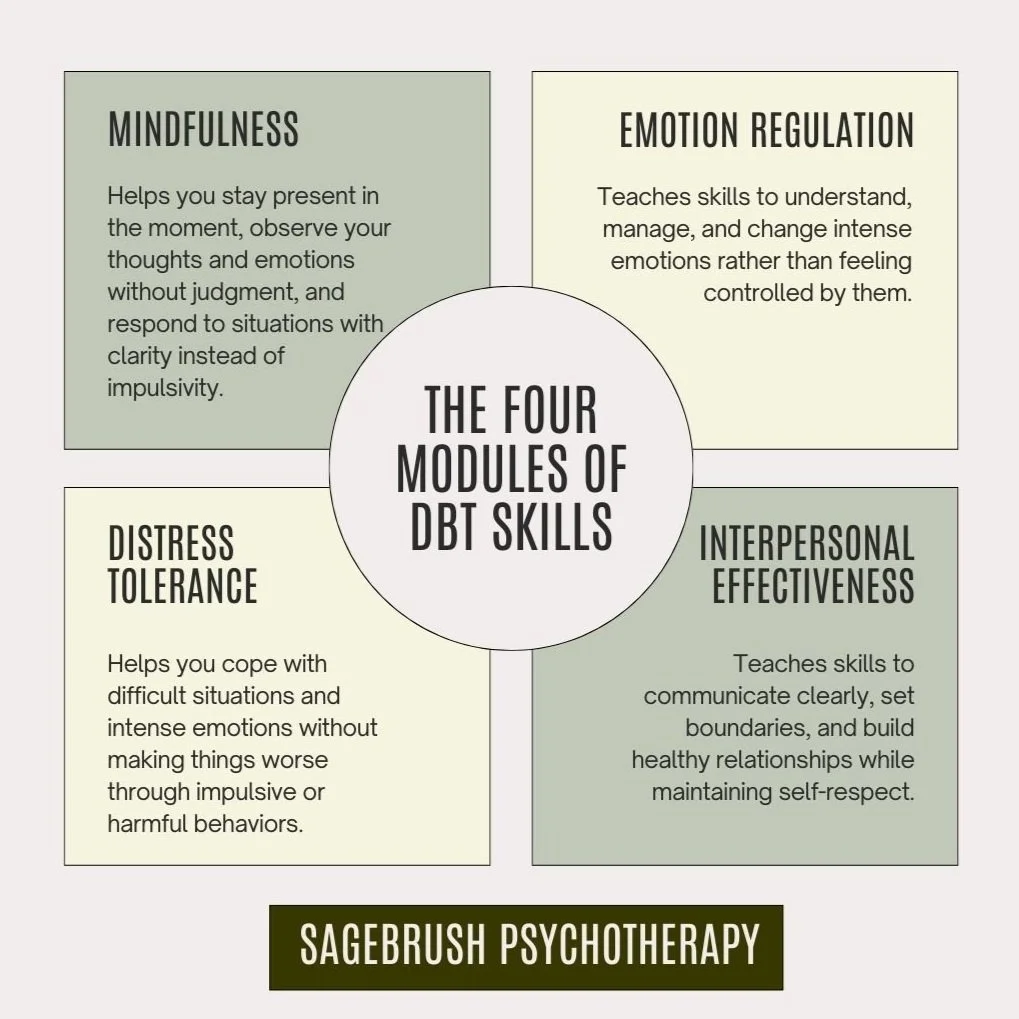DBT Skills Training in Los Angeles, CA
Learn the skills to manage emotions, handle stress, and build stronger relationships.
Our DBT Skills Offerings
All DBT skills services, including individual and group sessions, are $75 per session.
DBT Skills Group For Adults
All Genders:
Mondays 6-7:30 pm online
Wednesdays 6:30-8 pm online
Women’s Group:
Wednesdays 5-6:30 pm online
One on One DBT Skills
Scheduled with your therapist
DBT Group for High Schoolers
Saturdays 1-2:30 pm in person in Silverlake
Finding connection in a Dialectical Behavior Therapy group
Group therapy is about is about more than learning new skills, it's also about thoughtful connection. One powerful part of a Dialectical Behavior Therapy skills group is that you won’t go through it alone. You’ll be with people who understand what you’re going through. You’ll be in a space where where you can share, learn, and grow alongside people who are working toward the same goal: building a life worth living.
As you begin using DBT skills you learn from DBT therapists in treatment in your daily life, you’ll start noticing meaningful changes.
What a DBT Skills training session looks like
A DBT skills group is like a class that teaches practical tools to help people manage their emotions, handle stress, and improve their relationships. It is a core component of Dialectical Behavior Therapy, a Cognitive Behavioral Therapy (CBT) that integrates behavior therapy and acceptance strategies. Participating in a Dialectical Behavior Therapy skills group is a structured and supportive environment designed to help individuals develop concrete skills for managing emotions, improving relationships, and enhancing overall well-being. Here's what you can expect during a typical DBT group session:
1. Mindfulness Practice
Each session begins with a mindfulness exercise to help participants focus and center themselves. This could involve guided breathing, meditation, or an awareness activity to bring attention to the present moment. Mindfulness is a foundational skill in DBT, fostering emotional regulation and reducing reactivity.
2. Check Ins and Connection
Group members have an opportunity to share their progress, challenges, and successes in applying DBT skills. This fosters a sense of connection, validation, and mutual support. Participants are welcome to share at their comfort level.
3. Psychoeducation on the Skills of the Day
The heart of each session is focused on learning a specific DBT skill. These skills are drawn from core DBT modules discussed below.
The therapist or group leader explains the skill, provides examples, and facilitates discussions to ensure participants understand its practical application.
4. Homework Assignment
At the end of the session, participants receive a homework assignment to practice the skill learned that day in their daily lives. Homework helps bridge the gap between the group setting and real-world application, reinforcing growth and progress over time.
DBT skills groups are a collaborative and compassionate space where you can build emotional resilience, strengthen relationships, and gain tools to navigate life's challenges effectively.
The Four Modules of Dialectical Behavior Therapy Skills
1. Mindfulness
Increase self-awareness.
Reduce stress by focusing on the here and now.
Respond to situations with clarity rather than reacting impulsively. Mindfulness techniques include observing, describing, and participating in your experiences without judgment.
2. Emotion Regulation
Recognize and label emotions accurately.
Reduce emotional vulnerability by building a stable emotional baseline.
Develop healthier ways to respond to emotional triggers. With these skills, you can regain control over emotions and prevent them from overwhelming your daily life.
3. Distress Tolerance
Learning to tolerate intense emotions through self-soothing and distraction.
Accepting reality when it cannot be changed in the moment.
Developing resilience to handle challenging situations effectively. Distress Tolerance is especially useful during high-stress moments or emotional crises.
4. Interpersonal Effectiveness
Setting boundaries and saying "no" effectively.
Asking for what you need with confidence.
Maintaining self-respect while fostering positive relationships. Interpersonal Effectiveness teaches you how to navigate social situations with balance and assertiveness.





